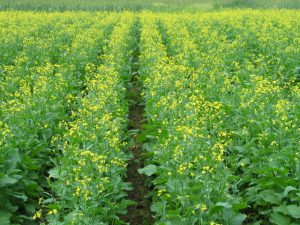Herbicide Tolerant Crops
 Canola, soybeans, and field corn are the principal herbicide tolerant crops being grown in Maine and New England. Adoption of this technology by soybean producers was extremely rapid (probably the most rapid adoption of any technology in history of agriculture), primarily because this herbicide approach provided growers with an herbicide that would not damage the crop, provided a wide spectrum of weed control, and gave growers a wider window of application timing than most other weed control approaches. Herbicide tolerant canola has been almost equally popular as growers had very few herbicide options. Herbicide-tolerant corn adoption rates have been somewhat slower as most Maine growers have preferred preemergence herbicide approaches for timing purposes with other tasks on the dairy farm.
Canola, soybeans, and field corn are the principal herbicide tolerant crops being grown in Maine and New England. Adoption of this technology by soybean producers was extremely rapid (probably the most rapid adoption of any technology in history of agriculture), primarily because this herbicide approach provided growers with an herbicide that would not damage the crop, provided a wide spectrum of weed control, and gave growers a wider window of application timing than most other weed control approaches. Herbicide tolerant canola has been almost equally popular as growers had very few herbicide options. Herbicide-tolerant corn adoption rates have been somewhat slower as most Maine growers have preferred preemergence herbicide approaches for timing purposes with other tasks on the dairy farm.
The strength of these approaches is that glyphosate and glufosinate (Roundup and Impact) are not likely to leach through soil and end up in ground or surface waters. Research conducted in the midwest indicates reduced incidence of specific preemergence herbicides in surface waters possibly due to reduced use caused by these newer technologies. See Trends in Concentrations and Use of Agricultural Herbicides for Corn Belt Rivers (PDF).
The risk to these approaches is that growers will use them too frequently or year after year, and weeds will become resistant to them. Growers adopting these technologies sign contracts not to save seed. Buying seed every year can reduce farm profitability. Also, alternatives to traited crop seeds are increasingly limited.
